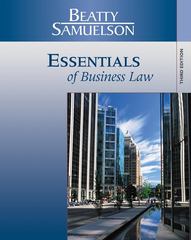Question
QUESTION 1 Some discretion in monetary policy is socially desirable because a.there is a need to adjust policy according to specific situations when the range
QUESTION 1
Some discretion in monetary policy is socially desirable because
- a.there is a need to adjust policy according to specific situations when the range of possible circumstances is complex.
- b.the ability of policymakers to change policies at will is necessary to make the political system responsive to the voters' demands.
- c.investment would always be higher if the public expects the central bank to deviate from its announced policies.
- d.fiscal policy is discretionary and must be counterbalanced by discretion in monetary policy.
- e.all of the above.
QUESTION 2
Independent central banks are run by professionals who are appointed by the elected officials. Once appointed, those professionals cannot be removed from office without cause before the end of their tenures, which are sufficiently long to go well beyond the terms of the elected officials. Which one of following isNOTa social advantage of delegating monetary policy to the professionals running an independent central bank when compared to keeping it under the control of elected politicians?
- a.The professionals running an independent central bank are more likely to be responsive to the demands of the public.
- b.The professionals running an independent central bank are likely to have more expertise in managing monetary policy.
- c.The professionals running an independent central bank are less likely to manipulate monetary policy as a means of gaining political advantage in elections.
- d.The professionals running an independent central bank are less likely to monetize government deficits as a way of expanding fiscal policy without a need for public borrowing.
- e.The professionals running an independent central bank are likely to conduct monetary policy with longer time horizons in mind.
QUESTION 3
In countries where government budget is determined by the representatives of various interest groups in the cabinet or in the legislature, fiscal policy may suffer from the "tragedy of the commons" because
- a.the budget needs to be approved in the House of Commons.
- b.the representatives of interest groups work against the interests of common people.
- c.the individual representatives have an incentive to vote for excess expenditures and tax cuts that benefit their constituencies at the cost of the economy as a whole.
- d.the individual representatives have an incentive to vote for expenditure reductions and tax increases that hurt everyone in the economy.
QUESTION 4
When the COVID-19 pandemic hit the U.S. population in 2020, the economy entered a very deep recession that had to be countered by major fiscal and monetary policy responses. Which one of the following frameworks would have offered an optimal macroeconomic policy to follow in that situation?
- a.Balanced budget laws.
- b.Fiscal golden rule.
- c.Constant growth rate rule for money supply.
- d.Currency board with a fixed exchange rate.
- e.None of the above.
Step by Step Solution
There are 3 Steps involved in it
Step: 1

Get Instant Access to Expert-Tailored Solutions
See step-by-step solutions with expert insights and AI powered tools for academic success
Step: 2

Step: 3

Ace Your Homework with AI
Get the answers you need in no time with our AI-driven, step-by-step assistance
Get Started


